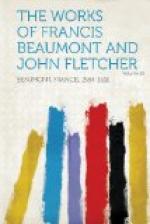Bush, and undeceive The Creditor, discharge his
debts; Why so, Since we can’t pay to Fletcher
what we owe. Oh could his Prophetesse
but tell one Chance, When that the
Pilgrimes shall returne from France. And
once more make this Kingdome, as of late, The
Island Princesse, and we celebrate A Double
Marriage; every one to bring To Fletchers
memory his offering. That thus at last unsequesters
the Stage, Brings backe the Silver, and the Golden
Age.
Robert Gardiner.
To the Manes of the celebrated Poets and Fellow-writers, Francis Beaumont and John Fletcher, upon the Printing of their excellent Dramatick Poems.
Disdaine not Gentle Shades, the lowly praise Which here I tender your immortall Bayes. Call it not folly, but my zeale, that I Strive to eternize you that cannot dye. And though no Language rightly can commend What you have writ, save what your selves have penn’d; Yet let me wonder at those curious straines (The rich Conceptions of your twin-like Braines) Which drew the Gods attention; who admir’d To see our English Stage by you inspir’d. Whose chiming Muses never fail’d to sing A Soule-affecting Musicke; ravishing Both Eare and Intellect, while you do each Contend with other who shall highest reach In rare Invention; Conflicts that beget New strange delight, to see two Fancies met, That could receive no foile: two wits in growth So just, as had one Soule informed both. Thence (Learned Fletcher) sung the muse alone, As both had done before, thy Beaumont gone. In whom, as thou, had he outlived, so he (Snatch’d first away) survived still in thee.
What though distempers of the present Age
Have banish’d your smooth numbers from the Stage? You shall be gainers by’t; it shall confer To th’ making the vast world your Theater. The Presse shall give to ev’ry man his part, And we will all be Actors; learne by heart Those Tragick Scenes and Comicke Straines you writ, Un-imitable both for Art and Wit; And at each Exit, as your Fancies rise, Our hands shall clap deserved Plaudities.
John Web.
To the desert of the Author in his most Ingenious Pieces.
Thou art above their Censure, whose darke Spirits Respects but shades of things, and seeming merits; That have no soule, nor reason to their will, But rime as ragged, as a Ganders Quill: Where Pride blowes up the Error, and transfers Their zeale in Tempests, that so wid’ly errs. Like heat and Ayre comprest, their blind desires Mixe with their ends, as raging winds with fires. Whose Ignorance and Passions, weare an eye Squint to all parts of true Humanity. All is Apocripha suits not their vaine: For wit, oh fye! and Learning too; prophane! But Fletcher hath done Miracles by wit, And one Line of his may convert them yet. Tempt them into the State of knowledge, and Happinesse to read and understand.




